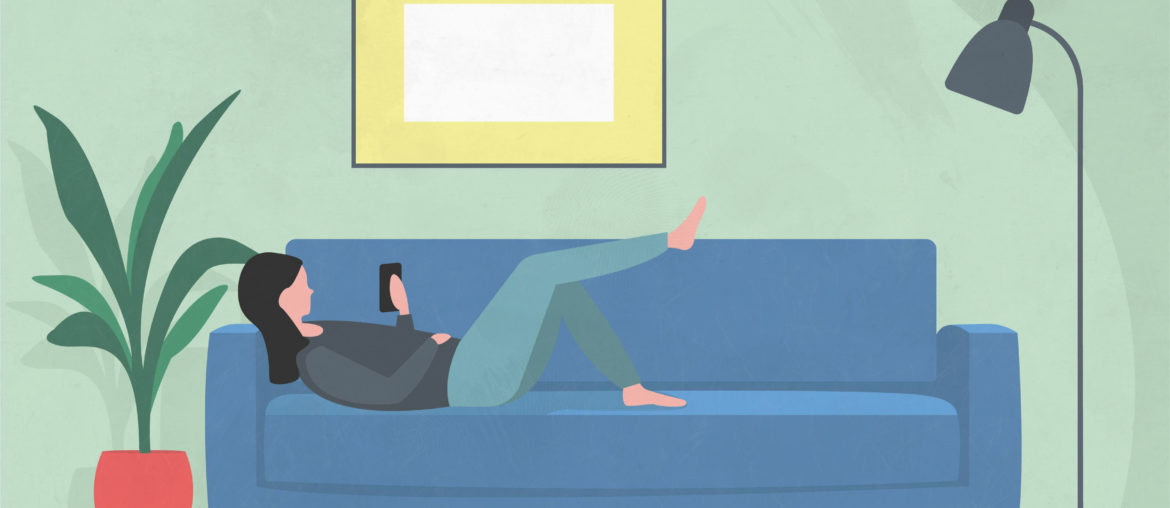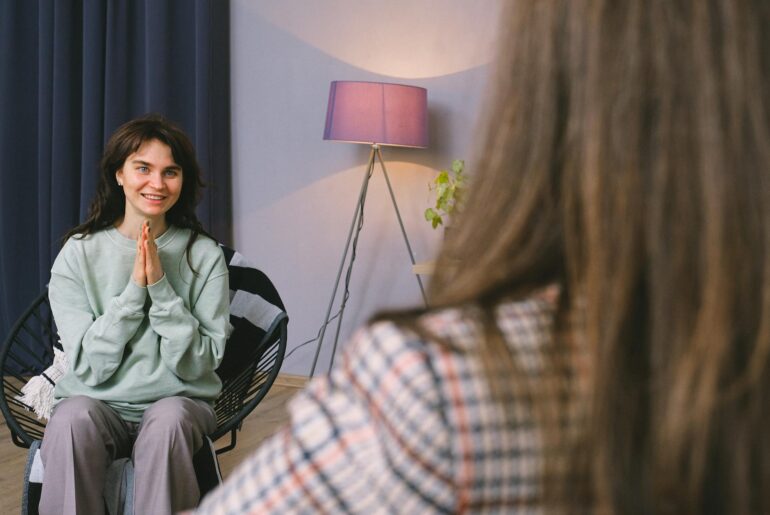Johanne is a Danish psychologist trained in behavioral methods and the co-founder of It's Complicated. She completed her education as a psychologist at the University of Copenhagen in 2013, with a master's degree and experience within the fields of narrative therapy, cognitive-behavioral therapy and acceptance and commitment therapy (ACT).
Last Updated on March 12, 2024 by It’s Complicated
Online therapy, sometimes also referred to as distance therapy or teletherapy, has become the new normal in the past years since the pandemic turned practically all person-facing industries on their heads. Whether you are doing regular face-to-face therapy already and circumstances prevent you from seeing your therapist in-person, or you are new to therapy and would like to have the maximum freedom of choice when picking the right person, it is pertinent to get the facts about online therapy straight. Let’s explore what we know.

Does online therapy work?
The risk that is most often mentioned about online counselling is that the counsellor can’t be properly attuned to the client. And seeing that accurate observation is crucial to assessment and treatment, this is a valid concern. Visual cues, body language and overall demeanour provides the therapist with important information about the individual’s well-being.
Studies suggest that the single most important factor for successful therapy is the therapeutic alliance, which is a fancy way of saying: A good match between the therapist and the client leads to effective therapy. Therefore, many people are concerned that online counselling is just too distant and impersonal to offer appropriate containment for a good therapeutic relationship. Put bluntly the question seems to be: Can staring at a screen ever be healing?
But if we take a look at the research, the findings show that online treatment can actually be very effective for many mental health issues. For instance, an article by Inc. gathered the results of the following newer studies:
A 2014 study published in the Journal of Affective Disorders found that online treatment was just as effective as face-to-face treatment for depression.
A 2018 study published in the Journal of Psychological Disorders found that online cognitive behavioral therapy is, “effective, acceptable and practical health care.” The study found the online cognitive behavioral therapy was equally as effective as face-to-face treatment for major depression, panic disorder, social anxiety disorder, and generalized anxiety disorder.
A 2014 study published in Behaviour Research and Therapy found that online cognitive behavioral therapy was effective in treating anxiety disorders. Treatment was cost-effective and the positive improvements were sustained at the one-year follow-up.
Does Online Therapy Work? Here’s What Science Says, Inc.
The pros of online treatment
Besides being provenly effective, online counselling also has some clear advantages that traditional face-to-face treatment doesn’t entail. It’s accessible to people living in remote or rural areas, those with limited or no transportation, and those who have mobility issues. And right now, in the midst of the coronavirus panic, online therapy might be the only way we can take measures to protect our emotional health, while also protecting our physical health.
Then there is the convenience that platforms offering online counselling allow its users anonymity, which can entice people who might otherwise have been embarrassed to seek support. Also, many online therapy services cost less than face-to-face treatment, and scheduling is more convenient for most people, because you can more easily fit in a session at odd hours – like right after you’ve woken up, or just before you go to bed.

Then there are seemingly small advantages, like therapy seekers not having to worry about seeing people they know in the waiting room. It can also be easier for some people to reveal private information when they’re sharing it online from the comfort and security of their own home.
Studies find that individuals with anxiety, especially social anxiety, are more likely to reach out to an online therapist. Plus, the degree of distance provided by video therapy – in contrast to in-person – has been shown to mitigate feelings of intimidation or loss of personal control that may be more prevalent in traditional therapy settings.
The drawbacks
While online therapy has a wide variety of potential benefits, it’s not for everyone and not without challenges. For instance, online therapy isn’t suitable for high-risk individuals, such as those suffering from psychosis or suicidal intent.
Also, like mentioned in the beginning of this article, without being able to interact face-to-face, therapists might miss out on body language and other cues that can help them arrive at an appropriate assessment and treatment plan. Then there are possible technological pitfalls, which can become a barrier. Dropped calls, frozen videos, and trouble accessing chats aren’t conducive to treatment.
Finally, some might find it more difficult to form a therapeutic alliance with someone when meetings aren’t face-to-face. The screen-to-screen of video sessions might feel inauthentic and too impersonal, for some.
How to find an online counsellor
For many of us, there might never have been a more important time than now to nurture our mental health. If you are interested in online therapy to assist you in getting through this time of increased uncertainty, there are many options to choose from. Think about what type of services you want most – video chats, phone therapy, live chats, audio messaging, text messaging. You may find a local therapist who offers online services or maybe you prefer a platform who offers a wide variety of online counsellors to choose from.
It’s Complicated also has therapists who offer online services. It’s worth remembering that with remote video therapy, you are able to leverage the benefit of a more extensive selection of therapists. This can be particularly beneficial if you are looking for a counsellor with specific experience – say anxiety – or with a particular language or cultural knowledge. Then you can try filtering these different preferences and find your perfect match.
Advantages of Discovering Your Therapist via It’s Complicated
- No Setup Costs: Creating an account and reaching out to therapists is entirely cost-free.
- Transparent Pricing: You’ll only pay the session fee, with no concealed booking fees.
- Precise Search: Utilise our robust search tool to pinpoint therapists based on your specific preferences.
- Thorough Listings: Easily explore therapists categorised by their specialty, approach, location, and language.
It’s Complicated is a therapy platform that not only helps clients find their perfect therapist but also supports therapists in their craft of helping others. Featuring over 2,000 mental health professionals from 80+ countries, counselling is available in almost 100 languages, both online and in person. A GDPR-compliant video solution, encrypted messaging, and easy invoicing guarantee a private and seamless counselling experience for therapists and clients alike. If you are in a serious crisis and need urgent help, please use one of these resources instead.






Comments are closed.